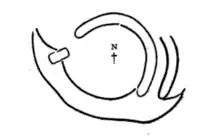Bicton Castle was a motte and bailey dating from the 11th or 12th century in the hamlet of Bicton, southwest Shropshire, England. Only the ditch and outer bank remain as other parts have been dug away during gravel extraction.[1] The short River Unk runs past it.[2]
Bicton Castle is situated 1.9 kilometer upstream of the larger Clun Castle, in Clun.[1] It is thought to have been held by a minor knight who held the local land in return for duties at Clun Castle. Its prime function was probably as a manorial centre for the flat area of surrounding farmland.
Construction

Bicton Castle was built by changing a low glacial mount. Although now oval in shape, the motte was likely to have been circular at first, with a diameter of 30 metres. At some point after it was abandoned, the ground was quarried for gravel. Its present-day height is 2.2 metres. A small bailey, 14 by 25 metres, was made by changing the shape of the southern part of the glacial mount.[1]
Bibliography
- Allcroft, A.H. (1908). Earthwork of England. London.
{{cite book}}: CS1 maint: location missing publisher (link) - Fry, P.S. (1980). Castles of the British Isles. David and Charles.
- King, C.D.J. (1983). Castellarium anglicanum: an index and bibliography of the castles in England, Wales and the Islands. Kraus International Publications.
- Pettifer, A. (1995). English castles - a guide by counties. Woodbridge: Boydell Press.
- Salter, M. (2001). The Castles and Moated Mansions of Shropshire. Malvern: Folly Publications.
References
- 1 2 3 "Bicton motte and bailey castle". Historic England. 9 March 2001.
- ↑ "Unk - source to conf R Clun". environment.data.gov.uk. Environment Agency - Catchment Data Explorer. Retrieved 18 March 2017.
- ↑ Hanshall, J. H. (1817). The History of the County Palatine of Chester. J. Fletcher. p. 513.